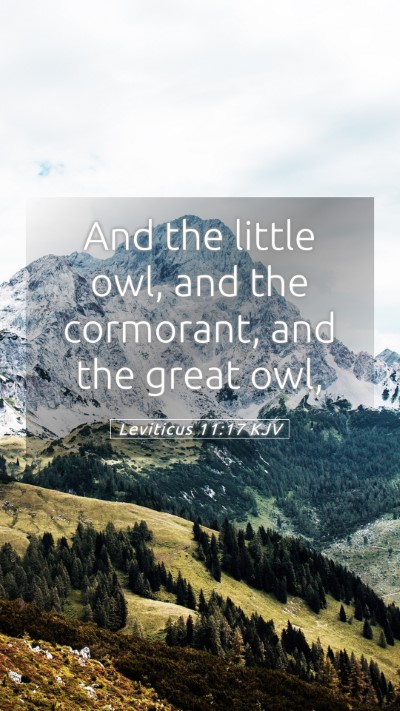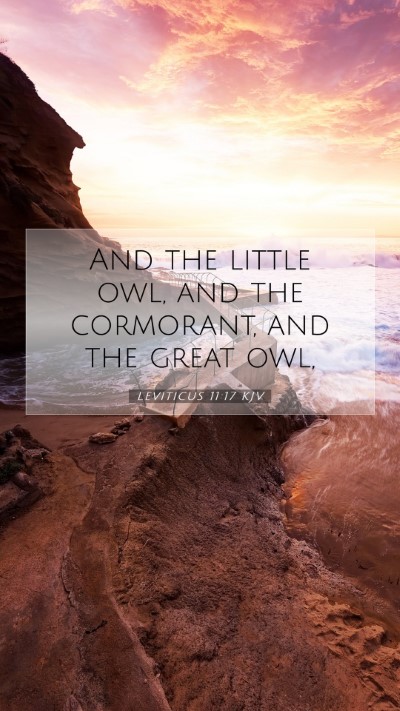Understanding Leviticus 11:17 - Bible Verse Commentary
Leviticus 11:17 states: "And the owl, and the night hawk, and the cuckow, after his kind." This verse falls within the larger context of dietary laws that God provided to the Israelites. These laws were intended to separate the people from the practices of the surrounding nations and to instill a sense of holiness.
Bible Verse Meanings
This verse specifically mentions certain birds considered unclean according to Biblical dietary regulations. The owl, night hawk, and cuckoo are examples of birds that the Israelites were prohibited from eating. Understanding this prohibition is crucial for grasping the larger theme of purity and obedience in the Mosaic Law.
Bible Verse Interpretations
-
Matthew Henry's Commentary:
Henry emphasizes that these animals signify the importance of obedience in all aspects of life, including diet. He notes that God's commands are often rooted in practical considerations, such as health and societal impact.
-
Albert Barnes' Notes:
Barnes points out that these birds often symbolize darkness and death, contrasting with the light and life represented by the clean animals. This dichotomy highlights the need for the Israelites to remain distinct from other cultures and practices.
-
Adam Clarke's Commentary:
Clarke elaborates on the symbolic nature of these unclean birds, suggesting that they represent the negative influences that can lead to spiritual death. The categorization of animals serves as a reflection of the moral and spiritual health of the community.
Bible Study Insights
In studying this verse, one can derive critical insights pertaining to:
- Obedience: Adhering to God's commandments demonstrates faithfulness.
- Holiness: The distinction between clean and unclean plays a significant role in maintaining holiness.
- Symbolism: Many of the animals listed as unclean have implications beyond dietary restrictions, often affecting moral and spiritual teachings.
Significance in Historical Context
The dietary laws, including those in Leviticus 11:17, reflect the ancient Israelites' need to stand apart from neighboring cultures that often engaged in practices contrary to their faith. This separation was both a physical and spiritual safeguard.
Applying Bible Verses to Daily Life
In a modern context, Leviticus 11:17 encourages believers to consider the influences in their lives – spiritually, morally, and socially. It invites reflection on what is 'clean' and 'unclean' in one's life choices, whether in diet, behavior, or companionship.
Additional Cross References
- Deuteronomy 14:12-18: This passage elaborates on the clean and unclean animals, providing further context to Leviticus 11.
- 1 Timothy 4:4-5: New Testament reflection on food and the blessing of all that God has created.
- Isaiah 66:17: References the consequences of eating unclean things, enforcing the theme of holiness.
Conclusion
The insights derived from Leviticus 11:17 serve not only to inform Bible study groups but also enable deeper understanding of scripture analysis. This interpretation aids anyone seeking to expand their knowledge on biblical teachings and how they apply to contemporary life. The careful study of scripture fosters a more profound grasp of the intention behind God's laws, promoting spiritual growth and ethical living.
Keywords: Bible verse meanings, Bible verse interpretations, Bible verse understanding, Bible verse explanations, Bible verse commentary, scripture analysis, biblical exegesis, Bible study insights, meaning of Bible verses, understanding Scripture.


